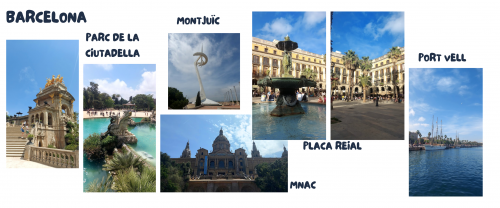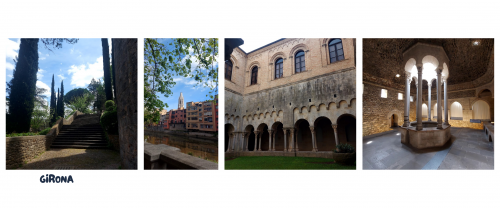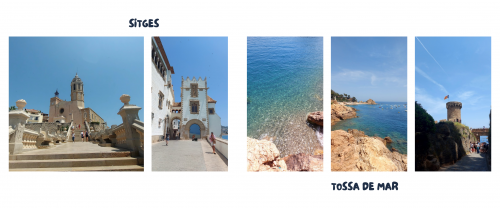Hi !! I’m Leyla, a third year Spanish and Linguistics student who just finished up my year abroad studying at Universitat Pompeu Fabra in Barcelona. Barcelona is a wonderful city, and despite being slightly overrun by tourists I had a wonderful time living there.
UNIVERSITY LIFE
Universitat Pompeu Fabra (UPF) has three different campuses: Campus de la Ciutadella, Campus Universitari Mar, and Campus del Poblenou. Campus de la Ciutadella is UPF’s main campus, but since I was studying under the Faculty of Translation and Interpretation, all of my classes were on Campus del Poblenou. All my classes were around 1-2 hours long, depending on the module, and each module consisted of one lecture and one seminar class a week. Most of the students under the Faculty of Translation and Interpretation were other international students, so the majority of my classes were taken with students from all over the world.
One thing to note is that whilst almost all my classes included participation/attendance as part of the final grade, it was not monitored that closely and I know many of us ending up skipping a class or two with little consequences to our final grades. That being said, the lecturers at UPF don’t tend to post things online after class besides the main powerpoint, so any important information was usually said in class or sent in an email.
The locations of both Campus de la Ciutadella and Campus del Poblenou are really nice (I didn’t visit Campus Universitari Mar so I can’t speak about it), with Campus de la Ciutadella located right next to Barcelona Zoo and Parc de la Ciutadella. Campus del Poblenou is located less than a minute walk from Westfield Gloriés and Parc de les Gloriés. Both campuses are also very close to metro and tram stations, which make getting to and from them very easy. Each campus has their own library and lots of study spaces, with the main library on Campus de la Ciutadella even being connected to Dipòsit de les Aigües via an underground tunnel.
EXPLORING BARCELONA
Barcelona is a big city, and even in my final few weeks I was still finding new places to explore. I would recommend spending the first few weeks visiting all the touristy areas and sites, and then going out and exploring different parts of the city. The transport system made it really easy to get around, and I never had to worry about train, tram or bus times since they were quite regular. The only exception to this is late at night, where you might have to wait for 15-20 minutes for the tram or the bus. Additionally, the transport system is very easy to navigate, and ticket machines have the option to switch to many different languages, so you don’t need to worry about not understanding anything. Furthermore, signs and notices about any updates for stop closures or changes in the metro schedule, will be in Catalan, Spanish and English.
My favourite places in Barcelona included the Gothic Quarter, where not only can you look at old architecture and La Catedral de Barcelona, but you can also check out all the independent art stores and shops that reside there. The Gothic Quarter also connects up to Placa de Catalunya and La Rambla, which makes it easy to knock off three tourist spots in one go. Another one of my favourite spots is Arc de Triomf, which is around a 15 minute walk from Campus de la Ciutadella. If you’re a fan of manga, comic books, graphic novels or just books in general, then you’ll find quite a few different shops around the area selling them (all in Spanish, although there are a few English bookstores scattered around the city).

THINGS TO WATCH OUT FOR
PICKPOCKETING
Infamously, Barcelona is known for its pickpocketing problem, something that was included in the safety presentation we received as part of our student orientation. I’ve heard my fair share of warnings before and even during my time in Barcelona, from both my friends and family in the UK to Barcelona natives. Whilst I was luckily not the victim of pickpocketing, I still advise people to be careful and extra cautious of their belongings at all times, especially if they’re alone since it really only takes a second for something to be stolen.
TARJETA DE IDENTIDAD (TIE) APPOINTMENTS
One thing you should make sure to do as soon as you get to Spain is secure your TIE appointment. It’s recommended that you do so in the first 90 days you’re in Spain, and speaking to classmates who were studying in other parts of Spain, the process of securing the appointment was a lot easier for them than for those of us in Barcelona. Getting a TIE appointment in Barcelona took me three months, and that was lucky. Despite arriving in September, I know some people didn’t get their appointments until January, which was after the 90 day period had already ended. There were no consequences for getting the appointment after the 90 day period, but it did cause a lot of unnecessary stress for a lot of us because we didn’t expect it to take so long.
Furthermore, all the information we received regarding the TIE was through other students. It was very much a game of checking the government website on certain days at certain times just for the possibility of getting an appointment, and even then you had to be quick because they disappeared if you refreshed the page or were kicked off the website. If I had known that getting the TIE appointment would’ve taken me three months, I would have arrived in Barcelona earlier or at least done it as soon as I arrived. Instead, it cost me three months of stress and anxiety before I managed to get it done. Thankfully, getting the appointment was the hard part, and after that was sorted going to the appointment itself and then collecting the TIE card was all fairly straightforward.
OTHER PLACES TO EXPLORE
One advantage of living in Spain was the high speed rails. There are quite a few nice options for daytrips outside of Barcelona, and the Erasmus Student Network (ESN) there offer discounts on group daytrips and guided tours with other international students. Some of the places I visited were Zaragoza, Girona, Sitges, and Tossa de Mar. Going to a university in Catalonia meant that there was no lack of stunning beaches and coastal towns to visit. Whilst in Girona I was able to enjoy old architecture and the history of the town, in Sitges and Tossa de Mar I spent time relaxing on the beach.


OUTRO
Overall I really enjoyed my time in Barcelona (minus the TIE crisis). In the summer months, near the end of my time there, the sun came out for weeks at a time, and it made me appreciate the city even more knowing that when I came back to the UK I would most likely be greeted by grey skies once again. I’ve been able to grow as a person and challenge myself by doing things I never thought I would be able to do. Barcelona is no longer just a holiday destination for me, but it has genuinely turned into a place I feel comfortable in.
muchas gracias tod@s !!
